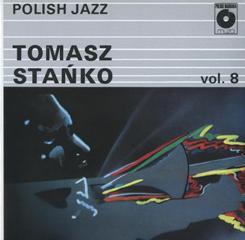Tomasz Stanko - Polish Jazz Vol.8 (1998)
Tomasz Stanko - Polish Jazz Vol.8 (1998)

01. Czatownik / The Ambusher [0:05:48.17] 02. Music For K [0:16:26.38] 03. Dark Awakening [0:12:43.20] 04. Mintuu Maria [0:05:21.12] 05. Alusta [0:11:35.50] 06. Daada [0:07:15.10] 07. Bushka [0:05:56.48] 08. Lady Go [0:05:51.07] 09. Last Song [0:02:34. Personnel: (1,2) Tomasz Stanko - tp Zbigniew Seifert - as Janusz Muniak - ts Bronislaw Suchanek - b Janusz Stefanski - dr (3,4) Tomasz Stanko - tp Tomasz Szukalski - ts, ss, bcl Edward Vesala - dr Peter Warren - b (5,6,7) Tomasz Stanko - tp Slawomir Kulpowicz - p Witold Szczurek - b Czeslaw Bartkowski - dr (8,9) Tomasz Stanko - tp Witold Szczurek - b, bg Apostolis Anthimos - dr, perc, g Tomasz Holuj – perc
Jazz trumpeter Tomasz Stańko began his tenure as a major force in European free jazz in the early '60s with the formation of the quartet Jazz Darins in 1962 with Adam Makowicz. From 1963 to 1967 he played with Krzysztof Komeda in a group that revolutionized European jazz and made an impact across the Atlantic as well. Stańko also put in time with Andrzej Trzaskowski in the mid-'60s before leading his own quintet from 1968 to 1973. The Tomasz Stanko Quintet, which included Muniak and Zbigniew Seifert, garnered considerable critical acclaim, especially for their tribute to Komeda entitled Music for K. The early '70s brought collaborations with a number of avant-garde and creative jazz artists, including the Globe Unity Orchestra, Michal Urbaniak, Cecil Taylor, and Gary Peacock. From 1974 to 1978, Stańko played in a quartet with Edward Vesala, then returned to performing as a leader and soloist. The '80s brought Stańko collaborations with Chico Freeman in Freeman's group Heavy Life, as well as work with James Spaulding, Jack DeJohnette, and Rufus Reid. He was also briefly part of Cecil Taylor's big band in 1984. Shortly afterward, he formed another ensemble, Freelectronic. The '90s brought an alliance with ECM, which issued some of Stańko's most acclaimed work, including another lush, gorgeous tribute to Komeda, 1997's Litania, which was heavy with that composer's film work. The follow-up on ECM, 2000's From the Green Hill, drew from many of the same emotional and historic sources as Komeda's work, but this time the compositions were Stańko's. In 2002, Stańko's contributions to European jazz were honored when he was issued the very first European Prize, which was intended to honor outstanding European jazz musicians. During the final round of voting from 21 critics from as many countries, Stańko won ten votes, narrowly topping the runner-up, Dutch piano player Misha Mengelberg. That same year Soul of Things was released on ECM, followed by Suspended Night in 2004, also on ECM. Too Pee appeared in 2006, as did Chameleon and Lontano. --- Stacia Proefrock, Rovi
download (mp3 @320 kbs):
Last Updated (Monday, 30 July 2018 18:18)








